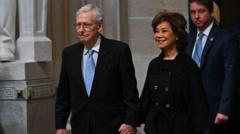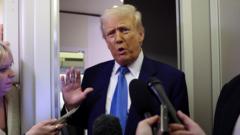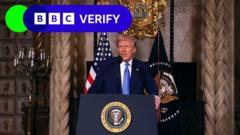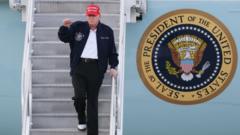Amid growing tensions and shifts in international diplomacy, European leaders are convening to address Ukraine's role and the implications of U.S. negotiations with Russia.
**E.U. Leaders Meet Amid Fears of U.S.-Russia Talks on Ukraine**

**E.U. Leaders Meet Amid Fears of U.S.-Russia Talks on Ukraine**
European leaders are coming together in Paris to discuss Ukraine as the U.S. shifts its approach to the conflict.
In response to the evolving geopolitical landscape, leaders from the European Union are scheduled to hold an urgent meeting in Paris today to strategize regarding the ongoing war in Ukraine and broader European security concerns. This meeting comes on the heels of the Trump administration's initiative to engage in discussions with Russia to seek a resolution for the conflict without directly involving European nations or Ukraine.
Ukrainian President Volodymyr Zelensky has made it clear that his government will never consent to any peace arrangement that excludes Kyiv from the negotiation table. In his remarks over the weekend, Zelensky reiterated the necessity for Ukraine to be actively included in any discussions regarding its fate and territorial integrity.
Looking ahead, three senior foreign policy officials from the Trump administration are expected to convene with Russian representatives in Saudi Arabia later this week to outline pathways towards concluding the war. The prospect of U.S. alignment with Russia has sparked substantial apprehension among European analysts and leaders, many of whom believe this could destabilize the already fragile situation in Eastern Europe.
U.S. officials, including Vice President JD Vance and Defense Secretary Pete Hegseth, have made statements that suggest a potential shift in U.S. foreign policy away from Europe towards ties with Moscow. Some experts argue that this realignment could afford President Vladimir Putin unprecedented gains that far exceed any territorial achievements in Ukraine.
In a controversial proposal, former President Trump suggested that Ukraine might have to concede half of its mineral resources in return for U.S. financial support. This suggestion was met with immediate rejection from Zelensky, who demanded solid security assurances as a prerequisite for any arrangement.
As the situation unfolds, it is evident that Trump's foreign policy approach harkens back to a more imperialistic style, raising concerns about possible repercussions on international diplomacy. Meanwhile, in domestic matters, Mayor Eric Adams of New York has disclosed intentions to sue the Trump administration over the retraction of $80 million previously allocated for migrant housing.
With Trump’s foreign policy strategies stirring a mix of apprehension and opposition, including backlash from frustrated liberal donors, this tumultuous period marks a critical juncture for U.S.-European relations and the future of the Ukraine conflict.
Ukrainian President Volodymyr Zelensky has made it clear that his government will never consent to any peace arrangement that excludes Kyiv from the negotiation table. In his remarks over the weekend, Zelensky reiterated the necessity for Ukraine to be actively included in any discussions regarding its fate and territorial integrity.
Looking ahead, three senior foreign policy officials from the Trump administration are expected to convene with Russian representatives in Saudi Arabia later this week to outline pathways towards concluding the war. The prospect of U.S. alignment with Russia has sparked substantial apprehension among European analysts and leaders, many of whom believe this could destabilize the already fragile situation in Eastern Europe.
U.S. officials, including Vice President JD Vance and Defense Secretary Pete Hegseth, have made statements that suggest a potential shift in U.S. foreign policy away from Europe towards ties with Moscow. Some experts argue that this realignment could afford President Vladimir Putin unprecedented gains that far exceed any territorial achievements in Ukraine.
In a controversial proposal, former President Trump suggested that Ukraine might have to concede half of its mineral resources in return for U.S. financial support. This suggestion was met with immediate rejection from Zelensky, who demanded solid security assurances as a prerequisite for any arrangement.
As the situation unfolds, it is evident that Trump's foreign policy approach harkens back to a more imperialistic style, raising concerns about possible repercussions on international diplomacy. Meanwhile, in domestic matters, Mayor Eric Adams of New York has disclosed intentions to sue the Trump administration over the retraction of $80 million previously allocated for migrant housing.
With Trump’s foreign policy strategies stirring a mix of apprehension and opposition, including backlash from frustrated liberal donors, this tumultuous period marks a critical juncture for U.S.-European relations and the future of the Ukraine conflict.























